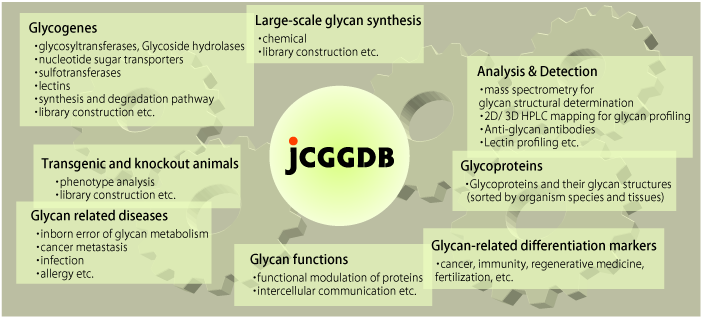As a part of Life Science Integrated Database project implemented by Ministry of Education, Culture, Sports, Science and Technology (MEXT), Research Center for Medical Glycoscience (RCMG) at National Institute of Advanced Industrial Science and Technology (AIST) has started to build Japan Consortium for Glycobiology and Glycotechnology database (JCGGDB). This project will last until 2010.
Japan Consortium for Glycobiology
and Glycotechnology DataBase


|
History & Overview (About us)Inauguration of management (administrative) officeTo establish a nationwide systemFirst of all, we started sharing and integrating 6 databases developed by Glycogene Function Team, Molecular Medicine Team and Lectin Application and Analysis Team at AIST. I.Mass spectral database of Glycans (GMDB : GlycoMass Database) In 2008, 3 Universities (Ritsumeikan University, Nagoya City University and Nagoya University) and an organization (Executive Committee of Lipid Database) newly joined the project. We will integrate the database which each institute has and the one of AIST. We are calling for the participation of research institutes, universities, companies and organizations which have glycan-related resources (data or model organisms, etc.) In order to build a database integrating all glycan-related data in Japan (glycoprotein, glycolipid, glycosaminoglycans, polysaccharides ,etc.), co-operation of other public institutes, universities and companies is necessary. We will set up the glycan portal sites on JCGGDB, and integrate databases of the followings: Large-quantity synthesis of glycogenes and glycans, analysis and detection of glycan structure and glycoprotein, glycan-related differentiation markers, glycan functions, glycan-related diseases and transgenic and knockout animals, etc. Therefore, we hold a JCGGDB group meeting several times a year. Future perspectivesWe are trying to build a database open to everyone while each organization maintains its own database. This makes it possible for everyone, even those who have little knowledge of glycans, to access and use the database intuitively. For the experts of glycans, it gives an easy access to specific information depending on the purpose. Link・Life Science Integrated Database portal site ・Japan Consortium for Glycobiology and Glycotechnology (JCGG) ・Research Center for Medical Glycoscience (RCMG), National Institute of Advanced Industrial Science and Technology (AIST) |




